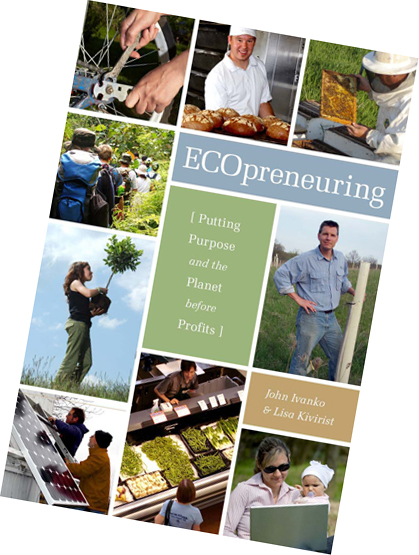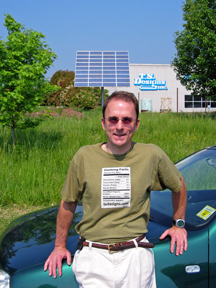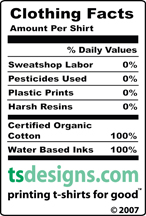T. S. Designs |  |
T. S. Designs |  |
Often stressed ecological systems emerge, evolve and reorganize in the most innovative ways. The same holds true for T. S. Designs, the nation's largest maker of the most sustainably printed T-shirts, that revolutionized the very process of manufacturing. Ironically, their transformation was brought about by the North American Free Trade Agreement (NAFTA), championed by the US government, that nearly destroyed their business when their customers shifted to off-shore sources for cheaper T-shirts. 
T. S. Designs, founded by Eric Henry and Tom Sineath, now uses 95 percent American-made organic cotton in their T-shirts. Its patented REHANCE printing process allows them to avoid using plastisol, normally made out of polyvinyl chloride (PVC), thus reducing the harmful ecological impacts of these ubiquitous products. But the company doesn't just make an eco-effective product; it transformed its business model from a focus on profits to operating by a triple bottom line: people, planet and profits. Instead of selling to the Gap and Nike, it now sells to Whole Foods Market and Greenpeace.
"Although Tom and I have always taken care of our employees and tried to make socially and environmentally responsible decisions with our business, our transition to a triple-bottom-line business was not spurred by inspiration, but by desperation," admits Eric, about their transition. "We believe that if you go outside your market to source a product that your market is capable of supplying, that is not sustainable. Unfortunately, this is due to NAFTA's and the World Trade Organization's missions that are driven solely by consumer price and do not consider environmental or quality-of-life costs."
 Realizing that Eric and Tom couldn't do it all on their own, T. S. Designs contracted with Sam Moore, a chemist and advisor related to T. S. Designs' evolution into a triple-bottom-line business. It's his breakthrough innovation related to the proprietary REHANCE process that created a competitive advantage for T. S. Designs, in more ways than one. "Sam had the foresight to develop it based on the green chemistry model, which emphasizes the lack of any front-end ingredient of a process whose disposal would be a concern on the back-end," explains Eric, in essence putting into practice the reality that there is "no away" to dispose of waste.
Realizing that Eric and Tom couldn't do it all on their own, T. S. Designs contracted with Sam Moore, a chemist and advisor related to T. S. Designs' evolution into a triple-bottom-line business. It's his breakthrough innovation related to the proprietary REHANCE process that created a competitive advantage for T. S. Designs, in more ways than one. "Sam had the foresight to develop it based on the green chemistry model, which emphasizes the lack of any front-end ingredient of a process whose disposal would be a concern on the back-end," explains Eric, in essence putting into practice the reality that there is "no away" to dispose of waste.
The REHANCE process is water based, with the printing taking place in the fabric, not on it. Most printing commonly uses plastisol made from PVC, hazardous to the environment both in its manufacture and disposal. With REHANCE, toxic aspects of the printing were avoided, while improving the quality of the printing on the T-shirt by eliminating cracking and flaking and improving breathability. Their move to purchase cotton from organic sources addresses the reality that about 25 percent of the world's pesticides are used on cotton. Forced by NAFTA to innovate to survive while adopting a triple-bottom-line approach to business, T. S. Designs emerged with a better product with a lower ecological impact.
Eric believes the triple-bottom-line approach can be used for just about any business. He started the Burlington Biodiesel Co-op at the T. S. Designs plant that now produces more than 200 gallons of biodiesel a week for employees and the community at large with its off-the-grid, green-built, card-swipe B100 biodiesel pump recently installed in partnership with Piedmont Biofuels. Then there are plans for a Company Shops Marketplace Co-op that will reconnect farmers with their community through a grocery store featuring locally grown or raised agricultural products. Like many ecopreneurs, Eric's Earth Mission lands him on various boards for numerous non-profit organizations, including Co-op America and area universities.
"I did not choose the textile industry because of its ability to express my Earth Mission," admits Eric. "My Earth Mission chose me because we were in the textile industry. Our desperate, difficult transition has made us even more aware of the importance of a sustainable business model and has given us a better perspective that allows us to be a leader for the cause."
Customers are still king, regardless of whether big business or big government tries to dictate otherwise. Ultimately, these customers determine the continued success of T. S. Designs and other green businesses, recognizing their own transformation from consumer back to citizen and their role in determining the kind of future they want. "Now that people are becoming aware of the costs of manufacturing other than the price they have to pay, such as environmental and social footprints, we are finding our model to be more rewarding every day," observes Eric. "As more and more people see value in an organic cotton T-shirt made in the United States, we gain customers. It's all about what they consider important to their lives."
"T-shirts and apparel in general has always been a conduit for transmission of ideas and concepts into the marketplace," continues Eric. "Consider Nike's branding of its own apparel; no one buys Nike for the product, they buy it for the message, for the brand. We decided that if Nike and companies like Nike can succeed with nothing but an image, we could easily succeed with our message because the contents of and processes that make our products reflect that message. Our products have both message and substance, something Nike can't achieve with their current model. Our Clothing Facts brand has definitely become the spearhead message that explains and advertises the substance of the products themselves."
| Advance Book Order Information Order your advance copy of ECOpreneuring today at a 22% discount off list price (a PDF file order form). The book will be shipped when available, most likely in May, 2008. |
ECOpreneuring blog | Speaking | In the News Resources | Share your Story | Homepage | W7843 County P Browntown WI 53522 E-mail: info@innserendipity.com www.ecopreneuring.biz |